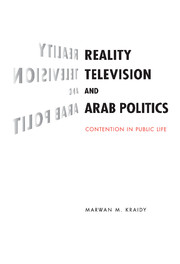Book contents
- Frontmatter
- Contents
- Acknowledgments
- Preface
- Introduction: Beyond al-Jazeera
- 1 Screens of Contention: The Battle for Arab Viewers
- 2 Voting Islam Off the Island? Big Brother in Bahrain
- 3 The Saudi-Lebanese Connection
- 4 Contesting Reality: Star Academy and Islamic Authenticity in Saudi Arabia
- 5 Gendering Reality: Kuwait in the Eye of the Storm
- 6 A Battle of Nations: Superstar and the Lebanon-Syria Media War
- 7 The “New Middle East”? Reality Television and the “Independence Intifada”
- Conclusion: Performing Politics, Taming Modernity
- List of Interviews
- Further Readings
- Bibliography
- Index
- Titles in the Series
- References
Bibliography
Published online by Cambridge University Press: 05 June 2012
- Frontmatter
- Contents
- Acknowledgments
- Preface
- Introduction: Beyond al-Jazeera
- 1 Screens of Contention: The Battle for Arab Viewers
- 2 Voting Islam Off the Island? Big Brother in Bahrain
- 3 The Saudi-Lebanese Connection
- 4 Contesting Reality: Star Academy and Islamic Authenticity in Saudi Arabia
- 5 Gendering Reality: Kuwait in the Eye of the Storm
- 6 A Battle of Nations: Superstar and the Lebanon-Syria Media War
- 7 The “New Middle East”? Reality Television and the “Independence Intifada”
- Conclusion: Performing Politics, Taming Modernity
- List of Interviews
- Further Readings
- Bibliography
- Index
- Titles in the Series
- References
- Type
- Chapter
- Information
- Reality Television and Arab PoliticsContention in Public Life, pp. 221 - 244Publisher: Cambridge University PressPrint publication year: 2009



